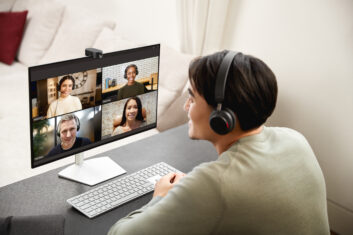According to research by Jabra, when asked how often they feel left out of the conversation in online meetings, Millennials were over 4 times as likely as Boomers to say they feel this way. Similarly, Gen X and Boomers were more than two times as likely to say they never feel left out of a conversation.
After years of resisting, many workers are now back in the workplace , bringing with them the return of in-person meetings. In fact,58% of all meetings are now held in meeting rooms, with roughly half of them involving online participants. The rise of hybrid work has resulted in new challenges in terms of inclusivity and the understanding of meeting room technology according to Jabra’s 2023 edition of its Hybrid Ways of Working Global Report conducted amongst 304 UK respondents (1,845 people in the total of six key markets worldwide).
Jabra’s new report uncovers the state of meetings in hybrid work, including the largest barriers and opportunities for employees and organisations. As hybrid work continues to impact employees’ habits and behaviours, leaders need to rethink their overall working models to ensure effective collaboration.
 Although Millennials are “digital natives”, they are also some of the youngest and least experienced employees, meaning they may lack the confidence to speak up in meetings. Leaders must be mindful of these intergenerational dynamics and effectively use meeting technology to create a more inclusive hybrid meeting culture. This gives each employee the confidence to share fresh ideas and actively participate in discussions in a way that best suits them.
Although Millennials are “digital natives”, they are also some of the youngest and least experienced employees, meaning they may lack the confidence to speak up in meetings. Leaders must be mindful of these intergenerational dynamics and effectively use meeting technology to create a more inclusive hybrid meeting culture. This gives each employee the confidence to share fresh ideas and actively participate in discussions in a way that best suits them.
Jabra’s research found 55% of employees believe that using video impacts how they perceive their colleagues in meetings. They agreed that their colleagues using video seem more competent, more engaged, and more trustworthy in meetings than those who do not. However, similar to the way that Millennials feel left out in online meetings, the research also found that they feel pressured to have their cameras on.
When employees can’t join a meeting in a way that works for them, remotely or in-person, employers run the risk of exacerbating existing issues within their teams, such as inequalities or negative social dynamics. Therefore, before leaders create mandatory video use policies, they must first be aware of the challenges that those policies can create.
According to the research, not enough has been done to support those returning to the office to get familiar with meeting room technology. In fact, 45% of employees say they’re hesitant to take meetings in a meeting room because they’re less comfortable with the technology compared to just using their own laptop.
As organisations around the world continue to upgrade their office meeting rooms, it’s essential that comprehensive training and guidance for employees is provided. By ensuring employees can use the technology, business leaders can maximise the benefits of their enhanced meeting rooms and foster a seamless transition into the hybrid work environment.
“As we all know, hybrid work is now the norm for millions of knowledge workers worldwide, bringing with it new challenges to the way we collaborate with one another,” said Holger Reisinger, SVP at Jabra. “While employees speak to the well-being benefits of flexible work, many employers have struggled to lead widely distributed teams. Moving forward, it’s essential that leaders give employees the tools they need and allow them to join meetings from where it best suits them. This will instil trust, empower decision-making, and allow the best ideas to rise to the top.”
You can download a copy of the full report here.







